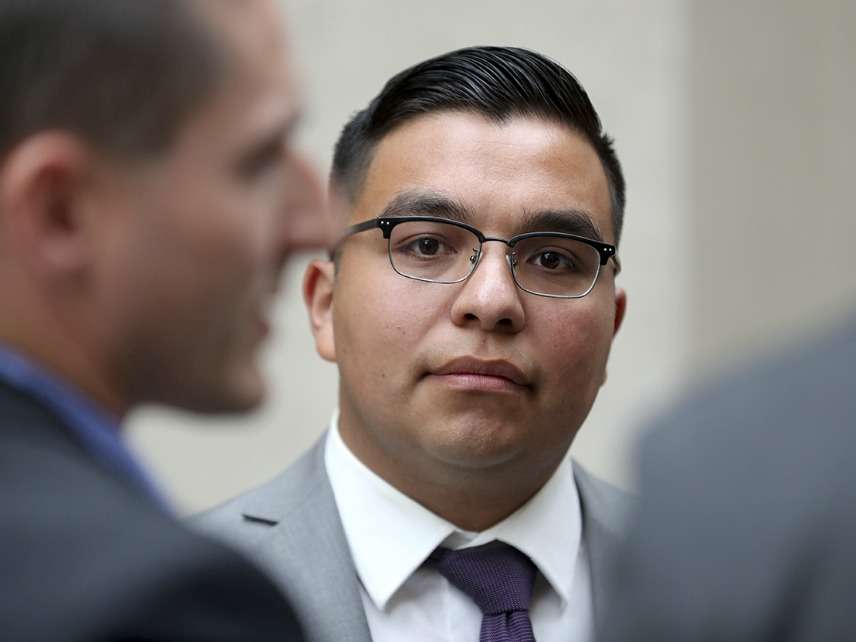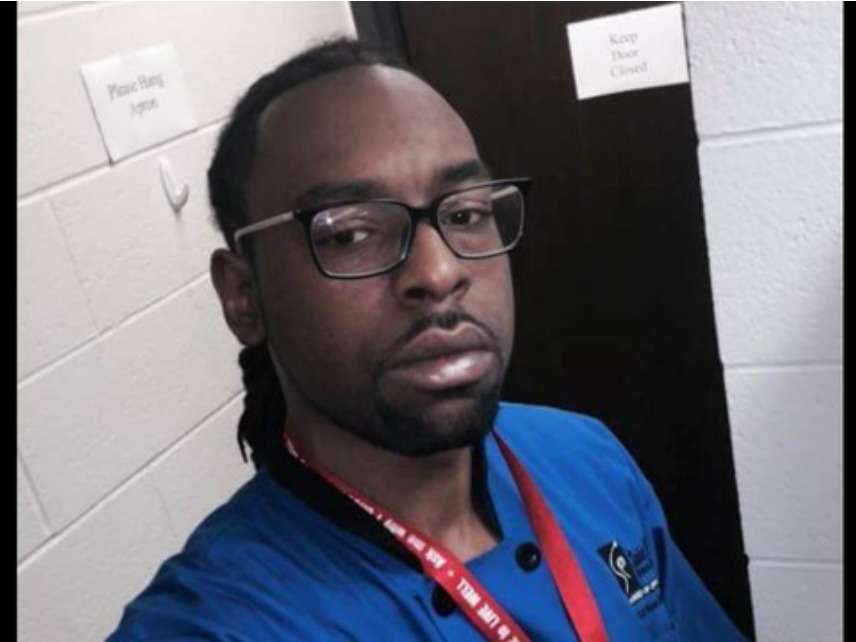Philando Castile's 'Audacity To Smoke Marijuana' in Front of Child Doomed Him, Says Cop Who Killed Him
Welcome to one of the darkest corners of your War on Drugs, ladies and gentlemen.

The shooting death last summer of Philando Castile, a licensed-and-law-abiding gun owner and cafeteria manager, by a Minnesota policeman provoked outrage over police brutality, especially since Castile's girlfriend was able to livestream the horrific event. Castile was shot seven times as he reached for his license and even though his girlfriend's young daughter was sitting in the backseat of his car.
The acquittal of St. Anthony Officer Jeronimo Yanez has led to a similar outpouring of anger, especially in light of dashcam footage that "shows a cop who panicked and killed an innocent man," in the words of Reason's Jacob Sullum.
A transcript of Yanez's explanation of his state of mind should only fuel more public discussion and calls to action.
From the Daily News:
"I thought if he's, if he has the, the guts and the audacity to smoke marijuana in front of the five-year-old girl and risk her lungs and risk her life by giving her secondhand smoke and the front seat passenger doing the same thing then what, what care does he give about me," Yanez told the Bureau of Criminal Apprehension.
The mind boggles: Secondhand smoke as a license to kill? Yanez even acknowledges that the girl "was in my line of fire" but that he "directed his firearm down…as best I could" to avoid her.
Yanez may face federal charges in the case and Castile's family plans to file a civil suit against him and the St. Anthony police force.
Regardless of any of that, Yanez's mind-set is incredibly telling not simply of his personal psychology but of a national mental disorder induced and exacerbated by the decades-old drug war. The drug war is not simply a set of laws and criminal procedures. It's much more like the Cold War, what I call a "structuring event" in American life that touches every aspect of our culture, politics, and commerce. From a 2006 talk I gave at a Students for a Sensible Drug Policy conference, on the topic of "What Would a Sensible Drug Policy Look Like?":
The drug war screws with everything that it touches, and it touches everything…What I want to do is try to create a post-prohibitionist mind-set, where we are no longer merely reacting to prohibition and trying to get rid of it, because in a way we become twinned with it….
When we talk about the Tour de France, we talk about drugs. When we talk about Major League Baseball, we talk about who's using them. Plan Colombia and a good chunk of our foreign policy is all about drugs. Hundreds of thousands of people are in jail because of drug policy. All of you [students] probably went through some form of bogus drug education program, all for no good reason. The real dead-end of this is…[found] in men's rooms in America. When you go and take a piss, there is a pretty good chance that the urinal cake holder, the thing that deodorizes it…says 'Say No To Drugs' on it….
The quick version of my sensible drug policy, of a post-prohibitionist policy, is that it would be smarter to regulate all drugs, including prescription drugs, somewhat like we do with alcohol….
Like drug warriors…we will need to stop imbuing inanimate objects with supernatural powers.
The drug war is over, if we want it—to paraphrase a famous anti-Vietnam war slogan. The end of the war starts up here, in our heads, and then proceeds out to the actual America. The starting point for a sensible drug policy, a true post-prohibitionist mind-set that does not participate in any way with prohibitionist thinking, would be take seriously the credo of the Whole Earth Catalog…"We are as gods, and we might as well get good at it." Ironically, the first step to becoming gods may be to recognize that drugs are only one means among many for changing who we are, how we live, and what we will become.

From the minute we're born, we are bombarded with messages and lessons about how drugs are bad, evil, and uniquely destructive; how they inherently give rise to criminality, violence, and mayhem; how we must forever be on the lookout for users, avoid becoming users (read: addicts!) ourselves, and rat out anyone we see using them; and on and on. Never mind that most of these dicta are utter bullshit, that it's the black-market status of drugs that brings violence and makes abuse more likely, and that the drug war has always been about controlling various threatening populations (minorities, youth, you name it). Or that over the past several decades, we have become veritable drug-taking machines (not a bad thing), relying on pills and herbs and exercise to treat our torpor, depression, and lack of focus and drive in everything from work to play to sex.
I don't doubt Yanez for a moment that in his frantic heart of hearts, he actually believed what he's quoted as saying above. That somehow all the lessons he—we—have been taught about the evils of pot, tobacco, "audacity," and more kicked in and amped up his fear, anxiety, and panic to a point where he was killing a man in the name of secondhand smoke and child endangerment. I say this not to exonerate him but to better understand where he and most of us are coming from. For the past 50 and 100 years, we have been propagandized relentlessly to believe the worst about drug users, even users of mostly harmless and chill-inducing substances such as weed. We won't actually be able to stop tragedies like the death of Philando Castile from happening until we unwind the drug war and its massive effect on our collective psyche.
We've been doing this, of course, especially over the past 21 years during which medical marijuana was first legalized. Recreational pot is even legal now in a handful of states and that number will only grow and force us to reevaluate the legal status of other, "harder" drugs. Not necessarily so we can all start snorting coke and ketamine, or dropping acid and mescaline like the long-lost children of Timothy Leary. No, so we can start being more honest with ourselves about the arbitrary lines between legal and what the government likes to insist are "illicit" drugs (not just illegal, you see, but immoral), and we can actually avail ourselves of a bigger and better pharmacopia. So we can also unwind laws and customs and habits of mind that have had massively disproportionate effects on the most vulnerable groups of people (minorities, the poor) and have produced the very violence and crime that we were trying to eliminate.
"We are as gods, and we might as well get good at it." We weren't good enough at it to save Philando Castile and millions of others whose lives have been snuffed out or derailed or made horrific for no good goddamn reason at all. The only questions that remain are whether and when we will be able to prevent senseless suffering in the future.
Watch "The Drug War as a "Structuring Event" in American Life."


Show Comments (102)